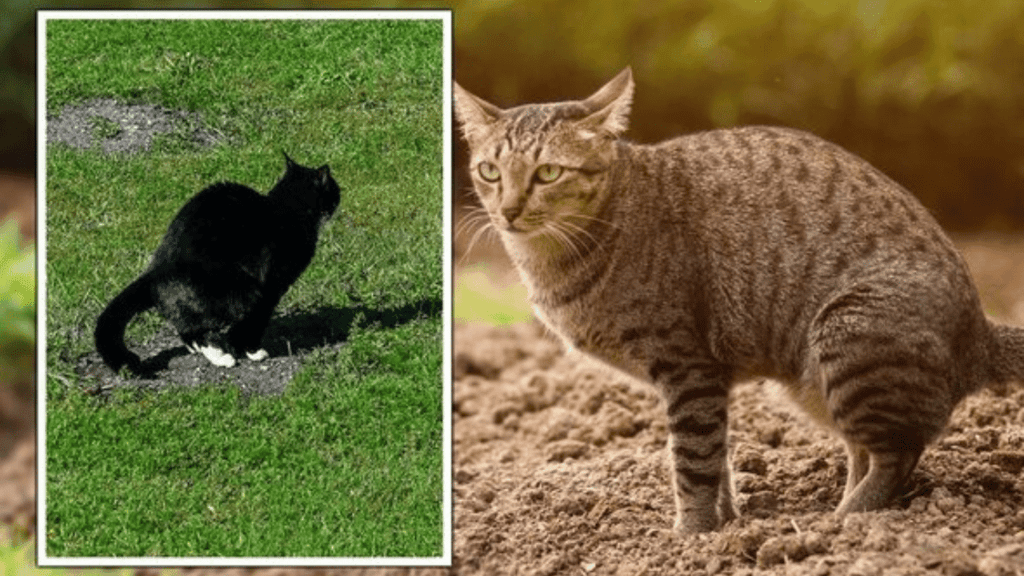
Yes, bleach can deter cats pooping in the garden. However, it is important to use it carefully to avoid harming the plants or the environment.
Introducing bleach to your garden can effectively keep cats from using it as their litter box. The strong smell of bleach generally repels cats. However, it is crucial to be cautious when using bleach, as it can harm plants and the ecosystem.
Cats are known to be attracted to the soft, loose soil in gardens, making it an inviting place to relieve themselves. This can frustrate garden owners who want to maintain a clean and feces-free space. Using bleach in the garden can be a deterrent, given its strong odor.
However, taking proper precautions when using bleach is essential to avoid any negative impacts on your plants and the environment. To use bleach as a cat deterrent, dilute it with water and sprinkle it around the areas where cats are known to poop.
The strong smell will hopefully discourage them from using your garden as their litter box. Nonetheless, it is crucial not to overuse bleach, as it can harm your plants and disrupt the natural balance of the soil. Furthermore, always consider alternative solutions before resorting to chemical interventions.
Understanding The Problem: Why Cats Poop In Gardens
When it comes to understanding why cats choose gardens as their preferred litter box, several common reasons can help shed some light on this frustrating issue. By understanding these reasons, we can begin to address the problem and find ways to deter cats from using our gardens as their personal bathroom.
Territory marking and communication
One of the main reasons why cats choose gardens as their litter box is territory marking and communication. Cats are territorial creatures by nature, using scent to establish and communicate their boundaries. Marking an area with urine or feces is their way of leaving their mark and telling other cats that this is their space. With their loose soil and vegetation, gardens provide the perfect medium for cats to mark their territory effectively.
Attraction to loose soil or mulch
Another reason why cats are drawn to gardens for elimination is their attraction to loose soil or mulch. Cats naturally prefer to dig and bury their waste, and gardens often offer the ideal environment for them to do so. The loose soil or mulch provides a soft and easy-to-dig surface for cats, making it more appealing than harder or less accommodating areas.
Seeking out undisturbed areas for elimination
Cats, being creatures of habit, seek out undisturbed areas for elimination. They prefer quiet and secluded spaces where they can do their business without feeling vulnerable or exposed. Gardens, with their abundance of plants, shrubs, and tall grasses, provide plenty of hiding spots for cats to relieve themselves in peace.
This desire for privacy and seclusion plays a significant role in why cats choose gardens over other locations. In conclusion, understanding why cats choose gardens as their preferred litter box is crucial in finding effective solutions to discourage them from doing so.
By addressing their territorial marking and communication needs, providing alternative options such as designated litter boxes, and making the garden less appealing through deterrents like motion-activated sprinklers or citrus scents, we can successfully protect our gardens from becoming feline restrooms. We can create a peaceful coexistence between our beloved cats and our well-maintained gardens with patience, consistency, and understanding.
Exploring The Myth: Does Bleach Deter Cats?
Investigating the claim that bleach repels cats from gardens
Every cat owner can attest to the frustration of finding their beloved feline’s feces in the garden. There are countless myths and remedies circulating on the internet regarding how to deter cats from using your garden as a personal litter box, and one popular suggestion is bleach. But does bleach have the power to repel cats?
Analyzing the chemical composition of bleach
To understand whether bleach can deter cats, it’s important to look closely at its chemical composition. Bleach is typically composed of sodium hypochlorite, a strong oxidizing agent. This means that when bleach comes into contact with organic matter, it breaks it down and destroys odors.
Discussing the potential deterrent effect on cats
While bleach may have a strong odor that is unpleasant for humans, it doesn’t necessarily have the same effect on cats. Cats have a highly sophisticated sense of smell, and what may be repulsive to us might not have the same impact on them. Additionally, cats are known to be creatures of habit, and their instinct to mark their territory may overpower any deterrent effect that bleach could have.
Highlighting any possible risks or dangers associated with using bleach in the garden
While using bleach alone may not deter cats, it’s important to address any risks or dangers associated with using bleach in the garden. Bleach is a toxic substance that can harm humans, animals, and plants if used improperly.
Direct contact with bleach can irritate the skin and eyes, and inhaling its fumes can cause respiratory issues. Additionally, bleach can harm plants and soil health, potentially disrupting the delicate balance of your garden ecosystem.
Considering the potential risks and the uncertainty of its effectiveness, it may be wise to explore alternative methods for deterring cats from your garden. These options could include creating physical barriers, using natural repellents like citrus peels or lavender, or even considering a designated area for cats to do their business.
Unveiling The Surprising Solution: Alternatives To Bleach
Using bleach might seem like a quick and easy solution when it comes to keeping cats away from your precious garden. However, with its strong chemical properties, bleach can be harmful not only to cats but to plants and soil as well. Luckily, safer and more eco-friendly alternatives can help you effectively deter cats without causing any harm.

Natural deterrents to keep cats away from the garden
Cats are known to dislike certain scents. By incorporating natural deterrents into your garden, you can create an environment cats want to avoid. Citrus scents are particularly effective in repelling cats. Simply collect leftover peels from fruits like oranges, lemons, or grapefruits and scatter them around your garden.
Utilizing citrus scents and peels
Another way to incorporate citrus scents into your garden is by making a homemade cat repellent spray. This can be done by combining water with a few drops of citrus essential oil. Spray this mixture around your garden, focusing on areas where cats frequently visit. Citrus scents are not only effective in deterring cats, but they also add a fresh and pleasant aroma to your outdoor space.
Creating noise deterrents with aluminum foil or wind chimes
Cats are known to be sensitive to unexpected noises. Utilizing noise deterrents can help keep them away from your garden. One common method is to lay strips of aluminum foil on the ground. The sound of walking on the foil will startle cats and discourage them from entering your garden. Another option is to hang wind chimes near the areas where cats are prone to enter. The gentle tinkling sound will act as a deterrent and keep cats at bay.
Incorporating textures and plants that cats dislike, like prickly mulch or lavender
Cats are also sensitive to certain textures. By incorporating materials that cats dislike, you can create an uninviting environment for them. Prickly mulch, such as pine cones or thorny twigs, can be spread around your garden beds to deter cats from digging or lounging. Additionally, planting cat-repellent plants like lavender can also be effective. Cats dislike the strong smell of lavender, making it a great natural deterrent.
Using alternatives to bleach is safer for cats and the environment and allows you to maintain a thriving garden without causing any harm. You can effectively keep your garden free from unwanted feline visitors by utilizing natural deterrents, incorporating citrus scents, creating noise deterrents, and incorporating textures and plants that cats dislike.
Implementing Effective Strategies To Protect Your Garden
One effective strategy for preventing cats from pooping in your garden is to make it a less appealing environment for them. Cats are naturally drawn to soft, loose soil that they can easily dig in. You can create a less inviting space for them by making a few simple changes. Here are some tips:
- Remove any existing cat waste from your garden regularly. Not only does this message to the cats that their scent is not welcome, but it also prevents the spread of disease.
- Cover your garden beds with gravel or mulch. Cats dislike the texture and will be deterred from digging in these areas.
- Plant prickly or thorny plants around the perimeter of your garden. These will create a deterrent and make it more difficult for cats to access your garden.
- Consider using natural deterrents such as citrus peels, coffee grounds, or lavender oil. These smells are unpleasant to cats and can help keep them away from your garden.
Another important aspect of protecting your garden from cats is to keep it clean and well-maintained. Cats are less likely to use a garden as their litter box if it is well cared for. Here are some suggestions for keeping your garden clean:
- Regularly remove fallen leaves, twigs, and other debris from your garden. This keeps it tidy and eliminates potential hiding spots for cats.
- Keep your lawn mowed and trimmed. Cats are less likely to use a well-maintained lawn as a litter box.
- Water your garden beds in the morning rather than at night. This allows the soil to dry out during the day, making it less attractive to cats.
- Use a natural, pet-friendly fertilizer in your garden. Harsh chemicals can harm cats and may attract them to the area.
Instead of trying to eliminate cats from your garden, you can provide them with an alternative designated area where they can be eliminated. This allows them to fulfill their natural instincts while protecting your garden. Here’s how you can do it:
- Create a separate area in your garden specifically for cats to use as their litter box. Choose a spot away from your plants and cover the area with loose soil or sand.
- Place a litter box or tray filled with sand or soil in the designated area. Cats are more likely to use it if it resembles their usual litter box.
- Regularly clean and maintain the designated area. This will encourage cats to continue using it and deter them from using other parts of your garden.
- Consider using a natural cat repellent in the areas you want to protect, such as lemon juice or vinegar. These smells are offensive to cats and will help redirect them to the designated area.
If you’ve tried other strategies and are still struggling with cats in your garden, it may be necessary to consider adding barriers or fencing to keep them out. This can help prevent cats from accessing your garden altogether. Here are some options to consider:
- Install a small fence or garden edging around your garden beds. Cats will be less likely to jump over, and this creates a physical barrier.
- Use netting or mesh to cover vulnerable areas, such as seedlings or freshly planted soil.
- Consider using motion-activated sprinklers or ultrasonic devices emitting high-frequency sound when cats approach. These can be effective deterrents for keeping cats out of your garden.
- Plant tall or dense shrubs around the perimeter of your garden to create a barrier that is difficult for cats to penetrate.
By implementing these effective strategies, you can protect your garden from cats and ensure a beautiful, poop-free outdoor space for everyone. Remember, consistency and persistence are key to success. Stay committed to maintaining a clean, cat-repellent environment, and you’ll have a perfectly cat-free garden!
Maintaining A Cat-Friendly And Garden-Friendly Environment
Recap of the non-toxic deterrents discussed
Throughout this blog post, we have explored various non-toxic deterrents that can help prevent cats from pooping in your garden. These alternatives to bleach offer effective solutions without harming the environment or causing any harm to our feline friends. Let’s quickly recap some of these cat-friendly options:
- Planting cat-repellent herbs such as lavender, rosemary, or rue.
- Utilizing citrus peels or sprays made from lemon or orange essential oils.
- Applying commercial cat repellent sprays containing natural ingredients like garlic or peppermint oil.
- Use motion-activated sprinklers that startle cats and discourage them from entering your garden.
Incorporating these non-toxic deterrents can help create a garden environment cats find unappealing for their bathroom needs.
Encouraging a harmonious coexistence between cats and gardens
While deterrents are key to preventing cats from pooping in your garden, we must remember that cats are just as entitled to enjoy outdoor spaces as we are. Instead of viewing them as nuisances, let’s encourage a harmonious coexistence between cats and gardens. Here are a few suggestions:
- Provide an alternative area designated for cats to do their business in your garden, such as a small sandpit or litter box.
- Ensure your garden design includes feline-friendly elements, like scratching posts, climbing structures, or cozy hiding spots.
- Consider planting catnip to attract cats to a specific area of your garden, diverting their attention from the rest of your plants.
By promoting a cat-friendly environment alongside your carefully tended garden, you can encourage cats to engage in mutually beneficial behaviors for both parties.
Emphasizing the importance of understanding and addressing the underlying reasons for cats pooping in the gardens
Recognizing that cats don’t randomly choose gardens as litter boxes is crucial. There are often underlying reasons behind their behavior. By understanding and addressing these reasons, you can take steps to minimize the occurrence of unwanted visits.
Some common underlying reasons include:
- Lack of access to a clean litter box or dissatisfaction with its location or cleanliness.
- Territorial marking due to the presence of other cats in the area.
- Health issues that may cause discomfort or difficulty in using the litter box.
Consulting with a veterinarian or animal behaviorist can help identify any health issues and provide guidance on how to address them. Ensuring your cat has a clean, accessible litter box and addressing territorial issues can also go a long way in preventing garden mishaps.
By taking these proactive measures, you can effectively maintain a cat-friendly and garden-friendly environment, allowing for a harmonious coexistence between our feline friends and beloved outdoor spaces.
Frequently Asked Questions Of Does Bleach Stop Cats Pooping In The Garden?
How Do I Stop Cats Pooping In My Garden Permanently?
To permanently stop cats from pooping in your garden, try these effective methods:
- Create physical barriers like fences or prickly plants to deter cats from entering your garden.
- Remove tempting attractions such as uncovered trash, food scraps, or sandboxes that may attract cats.
- Use natural repellents like citrus peels, coffee grounds, or lavender to discourage cats from frequenting your garden.
- Consider installing motion-activated sprinklers or ultrasonic deterrents to startle cats and discourage them from using your garden as a litter box.
How Can You Stop a Cat From Pooping in Your Garden?
To deter cats from pooping in your garden, place citrus peels or cayenne pepper around the area.
Will Vinegar Keep Cats From Pooping In Your Yard?
Yes, vinegar can deter cats from pooping in your yard.
Does Coffee Stop Cats Pooping In My Garden?
No, coffee does not stop cats from pooping in your garden.
Conclusion
While bleach may deter cats from pooping in your garden due to its strong smell, it is not a foolproof solution. Cats may become accustomed to the smell over time or find alternative spots in your garden. Moreover, bleach can be harmful to your plants and the overall ecosystem.
Instead, consider implementing other preventative measures such as using natural deterrents like citrus peels or coffee grounds, installing motion-activated sprinklers or fences, or creating a designated area for cats to do their business away from your garden. Remember to keep your garden clean, regularly remove cat feces, and make your space less inviting for cats by removing potential food sources.
By combining these strategies, you can effectively discourage cats from pooping in your garden without resorting to potentially harmful substances like bleach.






